高级英语_everyday_use课文赏析
- 格式:ppt
- 大小:688.00 KB
- 文档页数:16
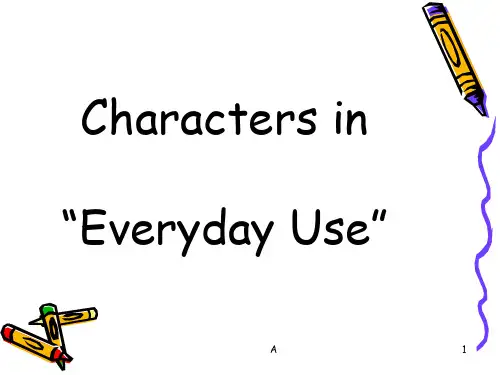
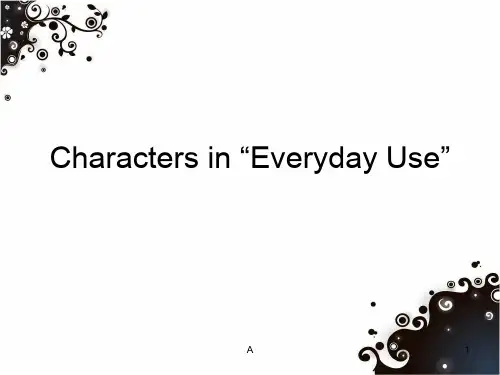
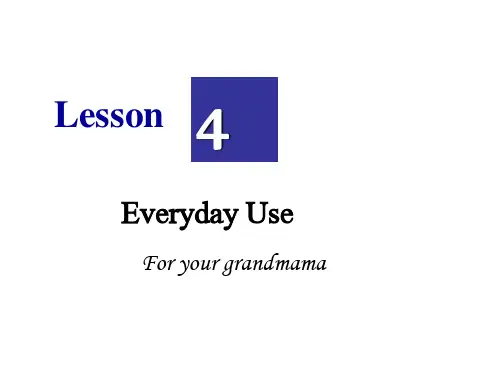
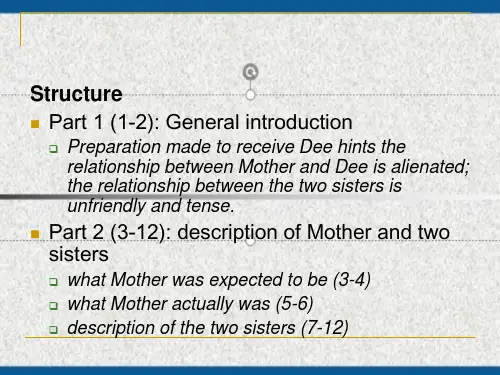
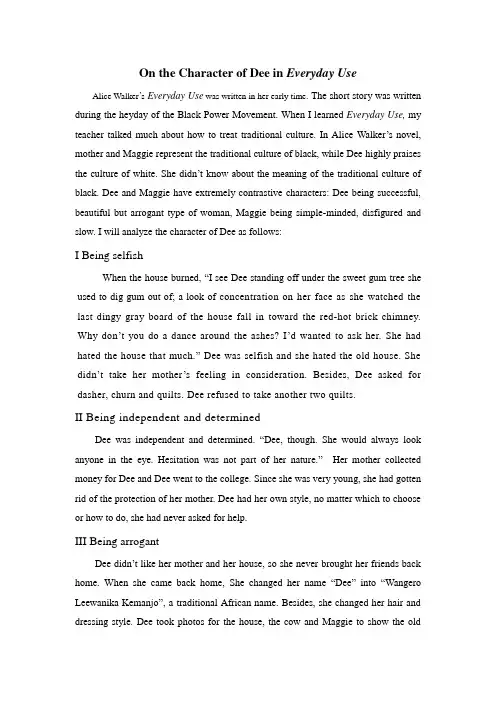
On the Character of Dee in Everyday Use Alice Walker’s Everyday Use was written in her early time. The short story was written during the heyday of the Black Power Movement. When I learned Everyday Use, my teacher talked much about how to treat traditional culture. In Alice Walker’s novel, mother and Maggie represent the traditional culture of black, while Dee highly praises the culture of white. She didn’t know about the meaning of the traditional culture of black. Dee and Maggie have extremely contrastive characters: Dee being successful, beautiful but arrogant type of woman, Maggie being simple-minded, disfigured and slow. I will analyze the character of Dee as follows:I Being selfishWhen the house burned, “I see Dee standing off under the sweet gum tree she used to dig gum out of; a look of concentration on her face as she watched the last dingy gray board of the house fall in toward the red-hot brick chimney. Why don’t you do a dance around the ashes? I’d wanted to ask her. She had hated the house that much.” Dee was selfish and she hated the old house. She didn’t take her mother’s feeling in consideration. Besides, Dee asked for dasher, churn and quilts. Dee refused to take another two quilts.II Being independent and determinedDee was independent and determined. “Dee, though. She would always look anyone in the eye. Hesitation was not part of her nature.”Her mother collected money for Dee and Dee went to the college. Since she was very young, she had gotten rid of the protection of her mother. Dee had her own style, no matter which to choose or how to do, she had never asked for help.III Being arrogantDee didn’t like her mother and her house, so she never brought her friends back home. When she came back home, She changed her name “Dee”into “Wangero Leewanika Kemanjo”, a traditional African name. Besides, she changed her hair and dressing style. Dee took photos for the house, the cow and Maggie to show the oldfashion off to her friends. But now it was different, Dee not only took photos, but also took her boyfriend back home. Compared with her former attitude towards everyday use, Dee showed tremendous cherish. She walked around the house to seek anything that had long history.In the past, the mother wanted to give the quilts to her elder daughter Dee. But Dee rejected them as too old-fashioned and out of style. Therefore the mother promised the quilts to her younger daughter Maggie. Now Dee asks her mother for the quilts and some more pieces of their family heritage because she now regards them as part of her cultural heritage, which she intends to hang on the wall. She wanted to show that she knew about African culture. So she was arrogant.In the end, against the expectation of Dee, the mother refused her wish and gave the quilts to Maggie, who would have agreed to give the quilts to her sister. Dee left without a piece of her family heritage, with her mother being satisfied with their simple southern life and with her sister Maggie, who would put the quilts to everyday use.From this novel, we should learn to have a right attitude to our culture and know the real meaning.。
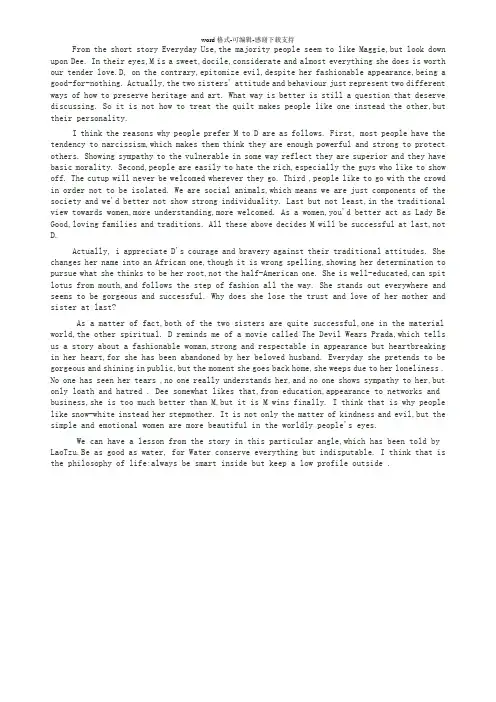
word格式-可编辑-感谢下载支持From the short story Everyday Use,the majority people seem to like Maggie,but look down upon Dee. In their eyes,M is a sweet,docile,considerate and almost everything she does is worth our tender love.D, on the contrary,epitomize evil,despite her fashionable appearance,being a good-for-nothing. Actually,the two sisters' attitude and behaviour just represent two different ways of how to preserve heritage and art. What way is better is still a question that deserve discussing. So it is not how to treat the quilt makes people like one instead the other,but their personality.I think the reasons why people prefer M to D are as follows. First, most people have the tendency to narcissism,which makes them think they are enough powerful and strong to protect others. Showing sympathy to the vulnerable in some way reflect they are superior and they have basic morality. Second,people are easily to hate the rich,especially the guys who like to show off. The cutup will never be welcomed wherever they go. Third ,people like to go with the crowd in order not to be isolated. We are social animals,which means we are just components of the society and we'd better not show strong individuality. Last but not least,in the traditional view towards women,more understanding,more welcomed. As a women,you'd better act as Lady Be Good,loving families and traditions. All these above decides M will be successful at last,not D.Actually, i appreciate D's courage and bravery against their traditional attitudes. She changes her name into an African one,though it is wrong spelling,showing her determination to pursue what she thinks to be her root,not the half-American one. She is well-educated,can spit lotus from mouth,and follows the step of fashion all the way. She stands out everywhere and seems to be gorgeous and successful. Why does she lose the trust and love of her mother and sister at last?As a matter of fact,both of the two sisters are quite successful,one in the material world,the other spiritual. D reminds me of a movie called The Devil Wears Prada,which tells us a story about a fashionable woman,strong and respectable in appearance but heartbreaking in her heart,for she has been abandoned by her beloved husband. Everyday she pretends to be gorgeous and shining in public,but the moment she goes back home,she weeps due to her loneliness . No one has seen her tears ,no one really understands her,and no one shows sympathy to her,but only loath and hatred . Dee somewhat likes that,from education,appearance to networks and business,she is too much better than M,but it is M wins finally. I think that is why people like snow-white instead her stepmother. It is not only the matter of kindness and evil,but the simple and emotional women are more beautiful in the worldly people's eyes.We can have a lesson from the story in this particular angle,which has been told by LaoTzu.Be as good as water, for Water conserve everything but indisputable. I think that is the philosophy of life:always be smart inside but keep a low profile outside .。
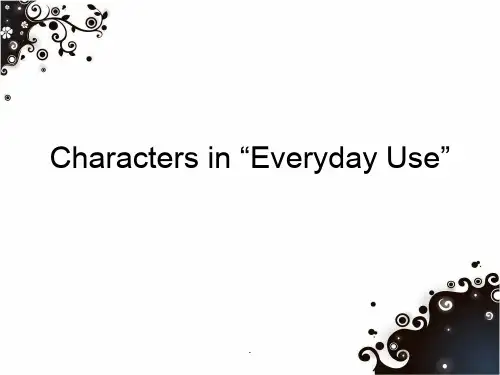
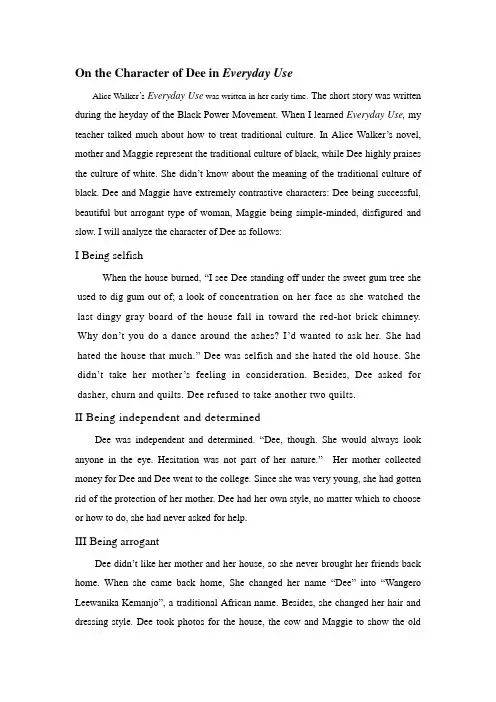
On the Character of Dee in Everyday UseAlice Walker’s Everyday Use was written in her early time. The short story was written during the heyday of the Black Power Movement. When I learned Everyday Use, my teacher talked much about how to treat traditional culture. In Alice Walker’s novel, mother and Maggie represent the traditional culture of black, while Dee highly praises the culture of white. She didn’t know about the meaning of the traditional culture of black. Dee and Maggie have extremely contrastive characters: Dee being successful, beautiful but arrogant type of woman, Maggie being simple-minded, disfigured and slow. I will analyze the character of Dee as follows:I Being selfishWhen the house burned, “I see Dee standing off under the sweet gum tree she used to dig gum out of; a look of concentration on her face as she watched the last dingy gray board of the house fall in toward the red-hot brick chimney. Why don’t you do a dance around the ashes? I’d wanted to ask her. She had hated the house that much.” Dee was selfish and she hated the old house. She didn’t take her mother’s feeling in consideration. Besides, Dee asked for dasher, churn and quilts. Dee refused to take another two quilts.II Being independent and determinedDee was independent and determined. “Dee, though. She would always look anyone in the eye. Hesitation was not part of her nature.”Her mother collected money for Dee and Dee went to the college. Since she was very young, she had gotten rid of the protection of her mother. Dee had her own style, no matter which to choose or how to do, she had never asked for help.III Being arrogantDee didn’t like her mother and her house, so she never brought her friends back home. When she came back home, She changed her name “Dee”into “Wangero Leewanika Kemanjo”, a traditional African name. Besides, she changed her hair and dressing style. Dee took photos for the house, the cow and Maggie to show the oldfashion off to her friends. But now it was different, Dee not only took photos, but also took her boyfriend back home. Compared with her former attitude towards everyday use, Dee showed tremendous cherish. She walked around the house to seek anything that had long history.In the past, the mother wanted to give the quilts to her elder daughter Dee. But Dee rejected them as too old-fashioned and out of style. Therefore the mother promised the quilts to her younger daughter Maggie. Now Dee asks her mother for the quilts and some more pieces of their family heritage because she now regards them as part of her cultural heritage, which she intends to hang on the wall. She wanted to show that she knew about African culture. So she was arrogant.In the end, against the expectation of Dee, the mother refused her wish and gave the quilts to Maggie, who would have agreed to give the quilts to her sister. Dee left without a piece of her family heritage, with her mother being satisfied with their simple southern life and with her sister Maggie, who would put the quilts to everyday use.。
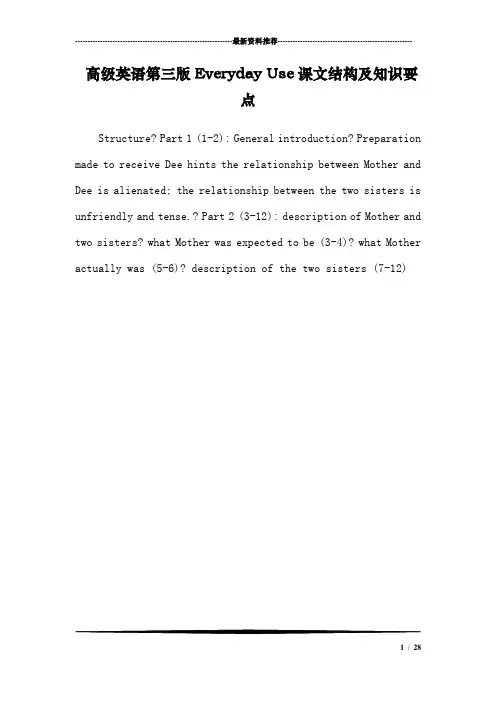
---------------------------------------------------------------最新资料推荐------------------------------------------------------高级英语第三版Everyday Use课文结构及知识要点Structure? Part 1 (1-2): General introduction? Preparation made to receive Dee hints the relationship between Mother and Dee is alienated; the relationship between the two sisters is unfriendly and tense.? Part 2 (3-12): description of Mother and two sisters? what Mother was expected to be (3-4)? what Mother actually was (5-6)? description of the two sisters (7-12)1/ 28? Part 3 (13-16): more about Mother and Dee ? Part 4 (17-81) Dee’s visit? (17-23) Dee and her boyfriend’s arrival ? (24-41) Dee’s new name ? (42-44) about Dee’s boyfriend ? (45-54) during the dinner: Dee wanted churntop and dasher ? (55-81) After dinner: Dee wanted the quilts.? Part 5 (the last para): Mother and Maggie felt relieved to see Dee leave---------------------------------------------------------------最新资料推荐------------------------------------------------------ ? Rhetorical device ? simile? My skin like an uncooked barley pancake. (para. 5) ? The scalding humor that erupted like bubbles in lye. (para.15)? metaphor? She tries to dig a well in the sand with her toe. (para. 18)? rhetorical question? Who ever knew a Johnson with a quick tongue? (para. 6) ? Who can ever imagine me looking a strange white man inthe eye? (同上)3/ 28? extended: prolonged, enlarged延长了的;扩展了的? extended family: usually three generations are involved; → nuclear family? groove: a long narrow path or track made in a surface, esp. to guide the movement of sth. 凹槽? A groove is a wide, deep line cut into a surface.? Sliding door moves along the groove it fits into.? She thinks her sister…of one hand,…to say to her.? She thinks that her sister has a firm control of her life, and could always have anything she wanted. Life was extremely generous to her.---------------------------------------------------------------最新资料推荐------------------------------------------------------ ? limousine: a large and very comfortable car, esp. one with a glass screen between the front and back seats.Limousines are usually driven by a chauffeur. (尤指富人或要人的)司机5/ 28? sledgehammer: a way of doing something that uses a lot more power or force than seems necessary (多费力气;多花精力)? He took a ~ approach to the whole thing. 他对整件事采取的是大锤敲胡桃的办法。


Everyday Use人物分析兼论其主题[摘要]在Everyday Use中,Maggie and Dee虽是出生于同一家庭的俩姐妹,但由于种种原因而形成的身体和心理方面的差异极大。
本文着重分析了这两个人物的差异,并探讨了其主题。
[关键词]Everyday Use,人物,主题Everyday Use出自〈高级英语〉(第一册,张汉熙主编)第四课,其作者是美国现代著名女作家Alice Walker。
作者在课文中以第一人称(mother of Dee and Maggie)巧妙、含蓄地道出两代黑人(mother and her two daughters)或者说同一代黑人(Dee and Maggie,two sisters)之间在思想观念以及黑人文化遗产上所面临的两难抉择以及他们所持的复杂态度。
尤其是关于黑人母亲对自己两个女儿(Dee and Maggie)的评价的描写更加有力地彰显了这种抉择的艰难和态度的复杂。
可见,Maggie and Dee虽是出生于同一家庭的俩姐妹,但由于种种原因而形成的身体和心理方面的差异极大。
一、Maggie and Dee差异分析作为少数民族最大的群体,美国的黑人是在经过数百年的交叉影响和相互作用下,非洲文化同美国白人文化的共同交融而孕育出的一种新型黑人—美国黑人或称美国非洲裔黑人。
由于美国政府在南北战争前一直奉行白人至上的政策,因此,虽然在数量上作为少数民族最大的群体的美国黑人,他们在政治、经济、文化以及社会生活等各方面却一直处于无权和被压迫的境地。
Alice Walke生于1944年,此时的美国在政治上较之从前已经发生了天翻地覆的变化。
比如说,轰轰烈烈的、席卷全国的废奴运动业已结束,发端于20 世纪20年代纽约市黑人聚居区—哈莱姆的“黑人文艺复兴”也方兴未艾。
因此,她所耳闻目睹的美国黑人无论在政治、经济还是文化等方面都有了明显的改观。
事实上,Alice Walke时代的美国黑人正面临着这样一种两难抉择:一方面,他们要不失时机地与白人交流和融合;另一方面,他们又必须想方设法地保全自己的传统和文化。
Everyday Use人物分析兼论其主题[摘要]在Everyday Use中,Maggie and Dee虽是出生于同一家庭的俩姐妹,但由于种种原因而形成的身体和心理方面的差异极大。
本文着重分析了这两个人物的差异,并探讨了其主题。
[关键词]Everyday Use,人物,主题Everyday Use出自〈高级英语〉(第一册,张汉熙主编)第四课,其作者是美国现代著名女作家Alice Walker。
作者在课文中以第一人称(mother of Dee and Maggie)巧妙、含蓄地道出两代黑人(mother and her two daughters)或者说同一代黑人(Dee and Maggie,two sisters)之间在思想观念以及黑人文化遗产上所面临的两难抉择以及他们所持的复杂态度。
尤其是关于黑人母亲对自己两个女儿(Dee and Maggie)的评价的描写更加有力地彰显了这种抉择的艰难和态度的复杂。
可见,Maggie and Dee虽是出生于同一家庭的俩姐妹,但由于种种原因而形成的身体和心理方面的差异极大。
一、Maggie and Dee差异分析作为少数民族最大的群体,美国的黑人是在经过数百年的交叉影响和相互作用下,非洲文化同美国白人文化的共同交融而孕育出的一种新型黑人—美国黑人或称美国非洲裔黑人。
由于美国政府在南北战争前一直奉行白人至上的政策,因此,虽然在数量上作为少数民族最大的群体的美国黑人,他们在政治、经济、文化以及社会生活等各方面却一直处于无权和被压迫的境地。
Alice Walke生于1944年,此时的美国在政治上较之从前已经发生了天翻地覆的变化。
比如说,轰轰烈烈的、席卷全国的废奴运动业已结束,发端于20 世纪20年代纽约市黑人聚居区—哈莱姆的“黑人文艺复兴”也方兴未艾。
因此,她所耳闻目睹的美国黑人无论在政治、经济还是文化等方面都有了明显的改观。
事实上,Alice Walke时代的美国黑人正面临着这样一种两难抉择:一方面,他们要不失时机地与白人交流和融合;另一方面,他们又必须想方设法地保全自己的传统和文化。
Everyday Use for your grandmamaAlice WalkerI will wait for her in the yard that Maggie and I made so clean and wavy yester day afternoon. A yard like this is more comfortable than most people know. It is not just a yard. It is like an extended living room. When the hard clay is swept clean as a floor and the fine sand around the edges lined with tiny, irregular grooves, anyone can come and sit and look up into the elm tree and wait for the breezes that never come inside the house.Maggie will be nervous until after her sister goes: she will stand hopelessly in corners, homely and ashamed of the burn scars down her arms and legs, eying her sister with a mixture of envy and awe. She thinks her sister has held life always in the palm of one hand, that "no" is a word the world never learned to say to her.You've no doubt seen those TV shows where the child who has "made it" is confronted, as a surprise, by her own mother and father, tottering in weakly from backstage. (A Pleasant surprise, of course: What would they do if parent and child came on the show only to curse out and insult each other?) On TV mother and child embrace and smile into each other's face. Sometimes the mother and father weep, the child wraps them in her arms and leans across the table to tell how she would not have made it without their help. I have seen these programs.Sometimes I dream a dream in which Dee and I are suddenly brought together on a TV program of this sort. Out of a cark and soft-seated limousine I am ushered into abright room filled with many people. There I meet a smiling, gray, sporty man like Johnny Carson who shakes my hand and tells me what a fine girl I have. Then we are on the stage and Dee is embracing me with tear s in her eyes. She pins on my dress a large orchid, even though she has told me once that she thinks or chides are tacky flowers.In real life I am a large, big-boned woman with rough, man-working hands. In the winter I wear flannel nightgowns to bed and overalls during the day. I can kill and clean a hog as mercilessly as a man. My fat keeps me hot in zero weather. I can work outside all day, breaking ice to get water for washing; I can eat pork liver cooked over the open tire minutes after it comes steaming from the hog. One winter I knocked a bull calf straight in the brain between the eyes with a sledge hammer and had the meat hung up to chill be-fore nightfall. But of course all this does not show on television. I am the way my daughter would want me to be: a hundred pounds lighter, my skin like an uncooked barley pan-cake. My hair glistens in the hot bright lights. Johnny Car – son has much to do to keep up with my quick and witty tongue.But that is a mistake. I know even before I wake up. Who ever knew a Johnson with a quick tongue? Who can even imagine me looking a strange white man in the eye? It seems to me I have talked to them always with one toot raised in flight, with my head turned in whichever way is farthest from them. Dee, though. She would always look anyone in the eye. Hesitation was no part of her nature."How do I look, Mama?" Maggie says, showing just enough of her thin body enveloped in pink skirt and red blouse for me to know she's there, almost hidden by the door."Come out into the yard," I say.Have you ever seen a lame animal, perhaps a dog run over by some careless person rich enough to own a car, sidle up to someone who is ignorant enough to be kind of him? That is the way my Maggie walks. She has been like this, chin on chest, eyes on ground, feet in shuffle, ever since the fire that burned the other house to the ground.Dee is lighter than Maggie, with nicer hair and a fuller figure. She's a woman now, though sometimes I forget. How long ago was it that the other house burned? Ten, twelve years? Sometimes I can still hear the flames and feel Maggie's arms sticking to me, her hair smoking and her dress falling off her in little black papery flakes. Her eyes seemed stretched open, blazed open by the flames reflect-ed in them. And Dee. I see her standing off under the sweet gum tree she used to dig gum out of; a look at concentration on her face as she watched the last dingy gray board of the house tall in toward the red-hot brick chimney. Why don't you do a dance around the ashes? I'd wanted to ask her. She had hated the house that much.I used to think she hated Maggie, too. But that was before we raised the money, the church and me, to send her to Augusta to school. She used to read to us without pity, forcing words, lies, other folks' habits, whole lives upon us two, sitting trapped and ignorant underneath her voice. She washed us in a river of make-believe, burned us with a lot of knowledge we didn't necessarily need to know. Pressed us to her with the serious way she read, to shove us away at just the moment, like dimwits, we seemed about to understand.Dee wanted nice things. A yellow organdy dress to wear to her graduation fromhigh school; black pumps to match a green suit she'd made from an old suit somebody gave me. She was determined to stare down any disaster in her efforts. Her eyelids would not flicker for minutes at a time. Often I fought off the temptation to shake her. At sixteen she had a style of her own' and knew what style was.I never had an education myself. After second grade the school was closed down. Don't ask me why. in 1927 colored asked fewer questions than they do now. Sometimes Maggie reads to me. She stumbles along good-naturedly but can't see well. She knows she is not bright. Like good looks and money, quickness passed her by. She will marry John Thomas (who has mossy teeth in an earnest face) and then I'll be free to sit here and I guess just sing church songs to myself. Although I never was a good singer. Never could carry a tune. I was always better at a man's job. 1 used to love to milk till I was hooked in the side in '49. Cows are soothing and slow and don't bother you, unless you try to milk them the wrong way.I have deliberately turned my back on the house. It is three rooms, just like the one that burned, except the roof is tin: they don't make shingle roofs any more. There are no real windows, just some holes cut in the sides, like the portholes in a ship, but not round and not square, with rawhide holding the shutter s up on the outside. This house is in a pasture, too, like the other one. No doubt when Dee sees it she will want to tear it down. She wrote me once that no matter where we "choose" to live, she will manage to come see us. But she will never bring her friends. Maggie and I thought about this and Maggie asked me, Mama, when did Dee ever have any friends?"She had a few. Furtive boys in pink shirts hanging about on washday after school.Nervous girls who never laughed. Impressed with her they worshiped the well-turned phrase, the cute shape, the scalding humor that erupted like bubbles in lye. She read to them.When she was courting Jimmy T she didn't have much time to pay to us, but turned all her faultfinding power on him. He flew to marry a cheap city girl from a family of ignorant flashy people. She hardly had time to recompose herself.When she comes I will meet -- but there they are!Maggie attempts to make a dash for the house, in her shuffling way, but I stay her with my hand. "Come back here," I say. And she stops and tries to dig a well in the sand with her toe.It is hard to see them clearly through the strong sun. But even the first glimpse of leg out of the car tells me it is Dee. Her feet were always neat-looking, as it God himself had shaped them with a certain style. From the other side of the car comes a short, stocky man. Hair is all over his head a foot long and hanging from his chin like a kinky mule tail. I hear Maggie suck in her breath. "Uhnnnh," is what it sounds like. Like when you see the wriggling end of a snake just in front of your toot on the road. "Uhnnnh."Dee next. A dress down to the ground, in this hot weather. A dress so loud it hurts my eyes. There are yel-lows and oranges enough to throw back the light of the sun. I feel my whole face warming from the heat waves it throws out. Earrings gold, too, and hanging down to her shoulders. Bracelets dangling and making noises when she moves her arm up to shake the folds of the dress out of her armpits. The dress is loose and flows, and as she walks closer, I like it. I hear Maggie go "Uhnnnh" again. It is her sister'shair. It stands straight up like the wool on a sheep. It is black as night and around the edges are two long pigtails that rope about like small lizards disappearing behind her ears."Wa-su-zo-Tean-o!" she says, coming on in that gliding way the dress makes her move. The short stocky fellow with the hair to his navel is all grinning and he follows up with "Asalamalakim, my mother and sister!" He moves to hug Maggie but she falls back, right up against the back of my chair. I feel her trembling there and when I look up I see the perspiration falling off her chin."Don't get up," says Dee. Since I am stout it takes something of a push. You can see me trying to move a second or two before I make it. She turns, showing white heels through her sandals, and goes back to the car. Out she peeks next with a Polaroid. She stoops down quickly and lines up picture after picture of me sitting there in front of the house with Maggie cowering behind me. She never takes a shot without making sure the house is included. When a cow comes nibbling around the edge of the yard she snaps it and me and Maggie and the house. Then she puts the Polaroid in the back seat of the car, and comes up and kisses me on the forehead.Meanwhile Asalamalakim is going through motions with Maggie's hand. Maggie's hand is as limp as a fish, and probably as cold, despite the sweat, and she keeps trying to pull it back. It looks like Asalamalakim wants to shake hands but wants to do it fancy. Or maybe he don't know how people shake hands. Anyhow, he soon gives up on Maggie."Well," I say. "Dee.""No, Mama," she says. "Not 'Dee', Wangero Leewanika Kemanjo!""What happened to 'Dee'?" I wanted to know."She's dead," Wangero said. "I couldn't bear it any longer, being named after the people who oppress me.""You know as well as me you was named after your aunt Dicle," I said. Dicie is my sister. She named Dee. We called her "Big Dee" after Dee was born."But who was she named after?" asked Wangero."I guess after Grandma Dee," I said."And who was she named after?" asked Wangero."Her mother," I said, and saw Wangero was getting tired. "That's about as far back as I can trace it," I said.Though, in fact, I probably could have carried it back beyond the Civil War through the branches."Well," said Asalamalakim, "there you are.""Uhnnnh," I heard Maggie say."There I was not," I said, before 'Dicie' cropped up in our family, so why should I try to trace it that far back?"He just stood there grinning, looking down on me like somebody inspecting a Model A car. Every once in a while he and Wangero sent eye signals over my head."How do you pronounce this name?" I asked."You don't have to call me by it if you don't want to," said Wangero."Why shouldn't I?" I asked. "If that's what you want us to call you, we'll call you. ""I know it might sound awkward at first," said Wangero."I'll get used to it," I said. "Ream it out again."Well, soon we got the name out of the way. Asalamalakim had a name twice as long and three times as hard. After I tripped over it two or three times he told me to just call him Hakim-a-barber. I wanted to ask him was he a barber, but I didn't really think he was, so I don't ask."You must belong to those beet-cattle peoples down the road," I said. They said "Asalamalakirn" when they met you too, but they didn't Shake hands. Always too busy feeding the cattle, fixing the fences, putting up salt-lick shelters, throwing down hay. When the white folks poisoned some of the herd the men stayed up all night with rifles in their hands. I walked a mile and a half just to see the sight.Hakim-a-barber said, "I accept some of their doctrines, but farming and raising cattle is not my style." (They didn't tell me, and I didn't ask, whether Wangero (Dee) had really gone and married him.)We sat down to eat and right away he said he didn't eat collards and pork was unclean. Wangero, though, went on through the chitlins and corn bread, the greens and every-thing else. She talked a blue streak over the sweet potatoes. Everything delighted her. Even the fact that we still used the benches her daddy made for the table when we couldn't afford to buy chairs."Oh, Mama!" she cried. Then turned to Hakim-a-barber. "I never knew how lovely these benches are. You can feel the rump prints," she said, running her hands underneath her and along the bench. Then she gave a sigh and her hand closed overGrandma Dee's butter dish. "That's it!" she said. "I knew there was something I wanted to ask you if I could have." She jumped up from the table and went over in the corner where the churn stood, the milk in it clabber by now. She looked at the churn and looked at it."This churn top is what I need," she said. "Didn't Uncle Buddy whittle it out of a tree you all used to have?""Yes," I said."Uh huh, " she said happily. "And I want the dasher,too.""Uncle Buddy whittle that, too?" asked the barber.Dee (Wangero) looked up at me."Aunt Dee's first husband whittled the dash," said Maggie so low you almost couldn't hear her. "His name was Henry, but they called him Stash.""Maggie's brain is like an elephants," Wanglero said, laughing. "I can use the churn top as a center piece for the alcove table,”she said, sliding a plate over the churn, "and I'll think of something artistic to do with the dasher."When she finished wrapping the dasher the handle stuck out. I took it for a moment in my hands. You didn't even have to look close to see where hands pushing the dasher up and down to make butter had left a kind of sink in the wood. In fact, there were a lot of small sinks; you could see where thumbs and fingers had sunk into the wood. It was beautiful light yellow wood, from a tree that grew in the yard where Big Dee and Stash had lived.After dinner Dee (Wangero) went to the trunk at the foot of my bed and startedrifling through it. Maggie hung back in the kitchen over the dishpan. Out came Wangero with two quilts. They had been pieced by Grandma Dee and then Big Dee and me had hung them on the quilt frames on the front porch and quilted them. One was in the Lone Star pattern. The other was Walk Around the Mountain. In both of them were scraps of dresses Grandma Dee had worn fifty and more years ago. Bit sand pieces of Grandpa Jarrell's Paisley shirts. And one teeny faded blue piece, about the size of a penny matchbox, that was from Great Grandpa Ezra's uniform that he wore in the Civil War."Mama," Wangero said sweet as a bird. "Can I have these old quilts?"I heard something fall in the kitchen, and a minute later the kitchen door slammed."Why don't you take one or two of the others?” 1 asked. "These old things was just done by me and Big Dee from some tops your grandma pieced before she died.""No," said Wangero. "I don't want those. They are stitched around the borders by machine.""That'll make them last better," I said."That's not the point," said Wanglero. "These are all pieces of dresses Grandma used to wear. She did all this stitching by hand. Imagine!" She held the quilts securely in her arms, stroking them."Some of the pieces, like those lavender ones, come from old clothes her mother handed down to her,” I said, moving up to touch the quilts. Dee (Wangero) moved back just enough so that I couldn't reach the quilts. They already belonged to her. "Imagine!" she breathed again, clutching them closely to her bosom."The truth is," I said, "I promised to give them quilts to Maggie, for when she marriesJohn Thomas."She gasped like a bee had stung her."Maggie can't appreciate these quilts!" she said. "She'd probably be backward enough to put them to everyday use.""I reckon she would," I said. "God knows I been savage ’em for long enough with nobody using 'em. I hope she will! ” I didn't want to bring up how I had offered Dee (Wangero) a quilt when she went away to college. Then she had told me they were old-fashioned, out of style."But they're priceless!" she was saying now, furiously, for she has a temper. "Maggie would put them on the bed and in five years they'd be in rags. Less than that!" "She can always make some more,” I said. "Maggie knows how to quilt. "Dee (Wangero) looked at me with hatred. "You just will not understand. The point is these quilts, these quilts!""Well," I said,, stumped. "What would you do with them?""Hang them," she said. As it that was the only thing you could do with quilts.Maggie by now was standing in the door. I could almost hear the sound her feet made as they scraped over each other."She can have them, Mama,” she said like somebody used to neve r winning anything, or having anything reserved for her. "I can 'member Grandma Dee without the quilts."I looked at her hard. She had filled her bottom lip with checkerberry snuff and it gave her face a kind of dopey, hangdog look. It was Grandma Dee and Big Dee whotaught her how to quilt herself. She stood there with her scarred hands hidden in the folds of her skirt. She looked at her sister with something like fear but she wasn't mad at her. This was Maggie's portion. This was the way she knew God to work.When I looked at her like that something hit me in the top of my head and ran down to the soles of my feet. Just like when I'm in church and the spirit of God touches me and I get happy and shout. I did something I never had done before: hugged Maggie to me, then dragged her on into the room, snatched the quilts out of Miss Wangero's hands and dumped them into Maggie's lap. Maggie just sat there on my bed with her mouth open."Take one or two of the others," I said to Dee.But she turned without a word and went out to Hakim-a-barber."You just don't understand," she said, as Maggie and I came out to the car."What don't I under stand?" I wanted to know."Your heritage," she said. And then she turned to Maggie, kissed her, and said, "You ought to try to make some-thing of yourself, too, Maggie. It's really a new day for us. But from the way you and Mama still live you'd never know it."She put on some sunglasses that hid everything above the tip of her nose and her chin.Maggie smiled; maybe at the sunglasses. But a real mile, not scared. After we watched the car dust settle I asked Maggie to bring me a dip of snuff. And then the two of us sat there just enjoying, until it was time to go in the house and go to bed.--------------------------------------------------------------------------------NOTES1) Alice Walker: born 1944 in Eatonton, Georgia, America and graduated from Sarah Lawrence College. Her books include The Third Life of Grange Copeland ( 1970 ), Meridian ( 1976 ), The Color Purple(1982), etc.2)"made it": to become a success, to succeed, either in specific endeavor or in general3) Johnny Carson: a man who runs a late night talk show4)hooked: injured by the horn of the cow being milked5) Jimmy T: 'T' is the initial of the surname of the boy Dee was courting.6)"Wa-su-zo-Tean-o!": phonetic rendering of an African dialect salutation7) "Asalamalakim": phonetic rendering of a Muslim greeting8) Polaroid: a camera that produces instant pictures9) the Civil War: the war between the North and the South in the U. S.(1861-1865)10) branches: branches or divisions of a family descending from a common ancestor11) Ream it out again: "Ream" is perhaps an African dialect word meaning: "unfold, display". Hence the phrase may mean "repeat" or "say it once again"12) pork was unclean: Muslims are forbidden by their religion to eat pork because it is considered to be unclean.13) Chitlins: also chitlings or chitterlings, the small intestines of pigs, used for food, a common dish in Afro-American households14) rump prints: depressions in the benches made by constant sitting15) sink: depressions in the wood of the handle left by the thumbs and fingers第四课外婆的日用家当艾丽斯•沃克尔“我会慢慢习惯的,”我说,“你给我再念一遍吧。
On the Character of Dee in Everyday Use Alice Walker’s Everyday Use was written in her early time. The short story was written during the heyday of the Black Power Movement. When I learned Everyday Use, my teacher talked much about how to treat traditional culture. In Alice Walker’s novel, mother and Maggie represent the traditional culture of black, while Dee highly praises the culture of white. She didn’t know about the meaning of the traditional culture of black. Dee and Maggie have extremely contrastive characters: Dee being successful, beautiful but arrogant type of woman, Maggie being simple-minded, disfigured and slow. I will analyze the character of Dee as follows:I Being selfishWhen the house burned, “I see Dee standing off under the sweet gum tree she used to dig gum out of; a look of concentration on her face as she watched the last dingy gray board of the house fall in toward the red-hot brick chimney. Why don’t you do a dance around the ashes? I’d wanted to ask her. She had hated the house that much.” Dee was selfish and she hated the old house. She didn’t take her mother’s feeling in consideration. Besides, Dee asked for dasher, churn and quilts. Dee refused to take another two quilts.II Being independent and determinedDee was independent and determined. “Dee, though. She would always look anyone in the eye. Hesitation was not part of her nature.”Her mother collected money for Dee and Dee went to the college. Since she was very young, she had gotten rid of the protection of her mother. Dee had her own style, no matter which to choose or how to do, she had never asked for help.III Being arrogantDee didn’t like her mother and her house, so she never brought her friends back home. When she came back home, She changed her name “Dee”into “Wangero Leewanika Kemanjo”, a traditional African name. Besides, she changed her hair and dressing style. Dee took photos for the house, the cow and Maggie to show the old fashion off to her friends. But now it was different, Dee not only took photos, but also took her boyfriend back home. Compared with her former attitude towards everyday use, Dee showed tremendous cherish. She walked around the house to seek anything that had long history.In the past, the mother wanted to give the quilts to her elder daughter Dee. But Dee rejected them as too old-fashioned and out of style. Therefore the mother promised the quilts to her younger daughter Maggie. Now Dee asks her mother for the quilts and some more pieces of their family heritage because she now regards them as part of her cultural heritage, which she intends to hang on the wall. She wanted to show that she knew about African culture. So she was arrogant.In the end, against the expectation of Dee, the mother refused her wish and gave the quilts to Maggie, who would have agreed to give the quilts to her sister. Dee left without a piece of her family heritage, with her mother being satisfied with their simple southern life and with her sister Maggie, who would put the quilts to everyday use.From this novel, we should learn to have a right attitude to our culture and know the real meaning.。